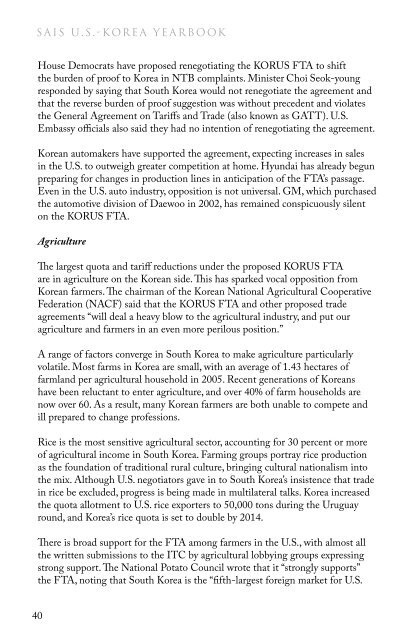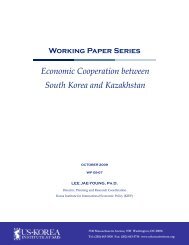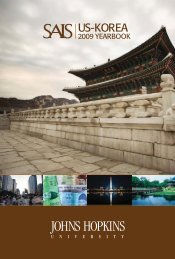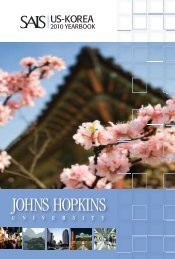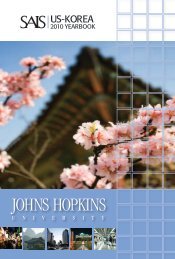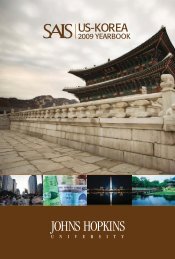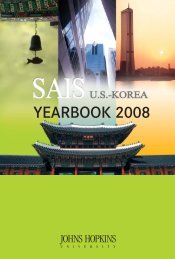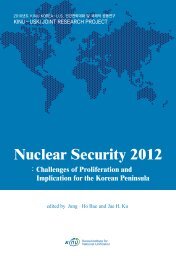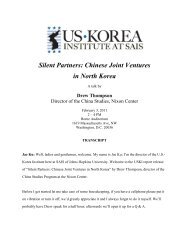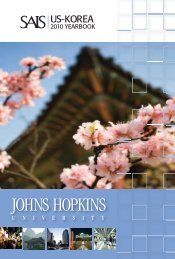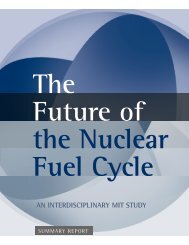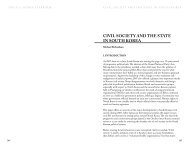YeArBooK 2007 - US-Korea Institute at SAIS
YeArBooK 2007 - US-Korea Institute at SAIS
YeArBooK 2007 - US-Korea Institute at SAIS
Create successful ePaper yourself
Turn your PDF publications into a flip-book with our unique Google optimized e-Paper software.
saIs U.s.-<strong>Korea</strong> YearbooK<br />
House Democr<strong>at</strong>s have proposed renegoti<strong>at</strong>ing the KOR<strong>US</strong> FTA to shift<br />
the burden of proof to <strong>Korea</strong> in NTB complaints. Minister Choi Seok-young<br />
responded by saying th<strong>at</strong> South <strong>Korea</strong> would not renegoti<strong>at</strong>e the agreement and<br />
th<strong>at</strong> the reverse burden of proof suggestion was without precedent and viol<strong>at</strong>es<br />
the General Agreement on Tariffs and Trade (also known as GATT). U.S.<br />
Embassy officials also said they had no intention of renegoti<strong>at</strong>ing the agreement.<br />
<strong>Korea</strong>n automakers have supported the agreement, expecting increases in sales<br />
in the U.S. to outweigh gre<strong>at</strong>er competition <strong>at</strong> home. Hyundai has already begun<br />
preparing for changes in production lines in anticip<strong>at</strong>ion of the FTA’s passage.<br />
Even in the U.S. auto industry, opposition is not universal. GM, which purchased<br />
the automotive division of Daewoo in 2002, has remained conspicuously silent<br />
on the KOR<strong>US</strong> FTA.<br />
40<br />
Agriculture<br />
The largest quota and tariff reductions under the proposed KOR<strong>US</strong> FTA<br />
are in agriculture on the <strong>Korea</strong>n side. This has sparked vocal opposition from<br />
<strong>Korea</strong>n farmers. The chairman of the <strong>Korea</strong>n N<strong>at</strong>ional Agricultural Cooper<strong>at</strong>ive<br />
Feder<strong>at</strong>ion (NACF) said th<strong>at</strong> the KOR<strong>US</strong> FTA and other proposed trade<br />
agreements “will deal a heavy blow to the agricultural industry, and put our<br />
agriculture and farmers in an even more perilous position.”<br />
A range of factors converge in South <strong>Korea</strong> to make agriculture particularly<br />
vol<strong>at</strong>ile. Most farms in <strong>Korea</strong> are small, with an average of 1.43 hectares of<br />
farmland per agricultural household in 2005. Recent gener<strong>at</strong>ions of <strong>Korea</strong>ns<br />
have been reluctant to enter agriculture, and over 40% of farm households are<br />
now over 60. As a result, many <strong>Korea</strong>n farmers are both unable to compete and<br />
ill prepared to change professions.<br />
Rice is the most sensitive agricultural sector, accounting for 30 percent or more<br />
of agricultural income in South <strong>Korea</strong>. Farming groups portray rice production<br />
as the found<strong>at</strong>ion of traditional rural culture, bringing cultural n<strong>at</strong>ionalism into<br />
the mix. Although U.S. negoti<strong>at</strong>ors gave in to South <strong>Korea</strong>’s insistence th<strong>at</strong> trade<br />
in rice be excluded, progress is being made in multil<strong>at</strong>eral talks. <strong>Korea</strong> increased<br />
the quota allotment to U.S. rice exporters to 50,000 tons during the Uruguay<br />
round, and <strong>Korea</strong>’s rice quota is set to double by 2014.<br />
There is broad support for the FTA among farmers in the U.S., with almost all<br />
the written submissions to the ITC by agricultural lobbying groups expressing<br />
strong support. The N<strong>at</strong>ional Pot<strong>at</strong>o Council wrote th<strong>at</strong> it “strongly supports”<br />
the FTA, noting th<strong>at</strong> South <strong>Korea</strong> is the “fifth-largest foreign market for U.S.<br />
<strong>Korea</strong>-U.s. fTa faCes UnCerTaIn fUTUre<br />
frozen french fry sales.” The N<strong>at</strong>ional Pork Producers Council said it expects the<br />
FTA to increase pork exports by close to $825 million. U.S. rice growers have<br />
opposed the KOR<strong>US</strong> FTA, fearing th<strong>at</strong> the exclusion of rice will set a precedent<br />
for future agreements.<br />
Beef<br />
The issue of beef exports to South <strong>Korea</strong> is particularly thorny, having become<br />
embroiled in politics and safety concerns. In 2003, South <strong>Korea</strong> banned imports<br />
of U.S. beef after a case of mad cow disease was discovered in the U.S., although<br />
some imports of deboned skeletal muscle me<strong>at</strong> were l<strong>at</strong>er allowed. In May<br />
<strong>2007</strong>, the World Organiz<strong>at</strong>ion for Animal Health (OIE) upgraded the U.S. to<br />
“controlled risk” st<strong>at</strong>us for mad cow disease, meaning th<strong>at</strong> bone-in beef could be<br />
exported under OIE protocols. <strong>Korea</strong>n regul<strong>at</strong>ors have refused to authorize the<br />
import<strong>at</strong>ion of U.S. bone-in beef despite U.S. pressure on South <strong>Korea</strong> to follow<br />
OIE protocols.<br />
The thre<strong>at</strong> of liberalized beef trade has already shaken <strong>Korea</strong>’s heavily protected<br />
beef market. The NACF reported in May <strong>2007</strong> th<strong>at</strong> the price of certain cut types<br />
of domestic beef had declined by as much as 27 percent since January because of<br />
fears of increased imports. Anti-FTA groups protested stores carrying U.S. beef<br />
when it was again allowed into <strong>Korea</strong> in July <strong>2007</strong>, and some stores were pelted<br />
with cow feces.<br />
Sen<strong>at</strong>e Finance Committee chairman Max Baucus (D-MT) has warned th<strong>at</strong> he<br />
will block the FTA from being considered by the Sen<strong>at</strong>e until the beef issue is<br />
resolved. In October, South <strong>Korea</strong>’s Finance Minister, Kwon O-kyu, met with<br />
sen<strong>at</strong>ors and promised th<strong>at</strong> the beef issue would be resolved “within the most<br />
reasonable time frame.” Th<strong>at</strong> same month, South <strong>Korea</strong>n Agriculture Minister<br />
Im Sang-gyu told <strong>Korea</strong>n lawmakers th<strong>at</strong> he would not back down on beef<br />
imports under U.S. pressure over the FTA and th<strong>at</strong> the resumption of beef<br />
imports would be decided on the basis of safety consider<strong>at</strong>ions.<br />
U.S. and <strong>Korea</strong>n negoti<strong>at</strong>ors met in October <strong>2007</strong> to try to resolve the impasse<br />
over beef. Thousands of South <strong>Korea</strong>n c<strong>at</strong>tle farmers surrounded the <strong>Korea</strong>n<br />
legisl<strong>at</strong>ure during the negoti<strong>at</strong>ions, opposing the admittance of U.S. beef into<br />
<strong>Korea</strong>. No agreement has yet been reached, although high-level and technical<br />
negoti<strong>at</strong>ions are continuing. The KOR<strong>US</strong> FTA has little chance of passage in the<br />
U.S. Sen<strong>at</strong>e until beef trade is normalized.<br />
41


